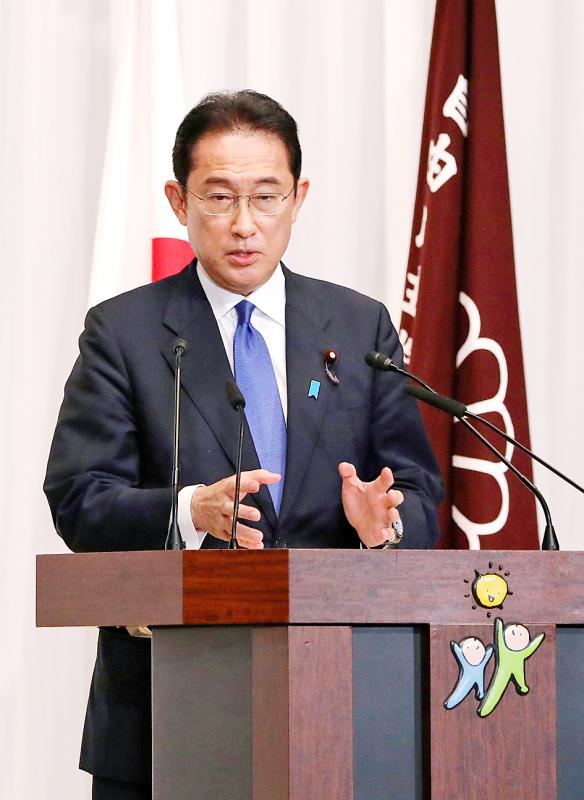Former Japanese minister of foreign affairs Fumio Kishida yesterday won the leadership election of the Liberal Democratic Party (LDP) and is set to become the nation’s next prime minister.
Kishida replaces Japanese Prime Minister Yoshihide Suga as party leader, with Suga stepping down after serving only one year since taking office in September last year.
As leader of the LDP, Kishida is certain to be elected the next prime minister on Monday next week in parliament, where his party and its coalition partner control both houses.

Photo: Reuters
In his victory speech, Kishida vowed to tackle Japan’s “national crises,” including COVID-19, an economy battered by the pandemic, and the declining population and birthrate, while pursuing “important issues related to Japan’s future” through a vision of “a free and open Indo-Pacific” that counters China’s assertiveness in the region.
Kishida beat Japanese Minister for Administrative Reform and Regulatory Reform Taro Kono, who is in charge of overseeing the nation’s COVID-19 vaccination program, in a runoff after finishing only one vote ahead of him in the first round, in which none of the four candidates, including two women, won a majority.
Kishida’s 257-170 win in the second round showed that he garnered more support from party heavyweights, who apparently chose stability over change advocated by Kono.
Kishida said that he has heard from many people complaining that they were being ignored.
“I felt our democracy is in a crisis,” he said.
“I, Fumio Kishida, have a special skill of listening to people. I am determined to make an effort toward making a more open LDP and a bright future for Japan together with you all,” he added.
He has called for a further increase in Japan’s defense capability and budget, and vowed to stand up to China in tensions over Taiwan and Beijing’s crackdown on dissent in Hong Kong.
However, little change is expected in key diplomatic and security policies under the new leader, said Yu Uchiyama, a political science professor at the University of Tokyo.
Kishida also supports close Japan-US security ties, and partnerships with other like-minded democracies in Asia and Europe, in part to counter China and North Korea.
Specifically, Kishida has said that wants to beef up Japan’s coast guard and backs passing of a resolution condemning China’s treatment of members of the Uighur minority.
He wants to appoint a prime ministerial aide to monitor their human rights situation.
“Taiwan is the biggest question for me,” said Jeffrey Hornung, senior political scientist at RAND Corp.
The outgoing Suga administration had been public in having conversations about Taiwan, Hornung said.
“It will be interesting to see whether the new leader takes this approach, such as advocating for Taiwan’s inclusion in” the Comprehensive and Progressive Agreement for Trans-Pacific Partnership, he said.
Taiwan last week applied to join the trade agreement.
Additional reporting by Reuters and staff writer

A magnitude 5.6 earthquake struck off the coast of Yilan County at 12:37pm today, with clear shaking felt across much of northern Taiwan. There were no immediate reports of damage. The epicenter of the quake was 16.9km east-southeast of Yilan County Hall offshore at a depth of 66.8km, Central Weather Administration (CWA) data showed. The maximum intensity registered at a 4 in Yilan County’s Nanao Township (南澳) on Taiwan’s seven-tier scale. Other parts of Yilan, as well as certain areas of Hualien County, Taipei, New Taipei City, Taoyuan, Hsinchu County, Taichung and Miaoli County, recorded intensities of 3. Residents of Yilan County and Taipei received

Taiwan has secured another breakthrough in fruit exports, with jujubes, dragon fruit and lychees approved for shipment to the EU, the Ministry of Agriculture said yesterday. The Animal and Plant Health Inspection Agency on Thursday received formal notification of the approval from the EU, the ministry said, adding that the decision was expected to expand Taiwanese fruit producers’ access to high-end European markets. Taiwan exported 126 tonnes of lychees last year, valued at US$1.48 million, with Japan accounting for 102 tonnes. Other export destinations included New Zealand, Hong Kong, the US and Australia, ministry data showed. Jujube exports totaled 103 tonnes, valued at

BIG SPENDERS: Foreign investors bought the most Taiwan equities since 2005, signaling confidence that an AI boom would continue to benefit chipmakers Taiwan Semiconductor Manufacturing Co’s (TSMC, 台積電) market capitalization swelled to US$2 trillion for the first time following a 4.25 percent rally in its American depositary receipts (ADR) overnight, putting the world’s biggest contract chipmaker sixth on the list of the world’s biggest companies by market capitalization, just behind Amazon.com Inc. The site CompaniesMarketcap.com ranked TSMC ahead of Saudi Aramco and Meta Platforms Inc. The Taiwanese company’s ADRs on Tuesday surged to US$385.75 on the New York Stock Exchange, as strong demand for artificial intelligence (AI) applications led to chip supply constraints and boost revenue growth to record-breaking levels. Each TSMC ADR represents

TRUST: The KMT said it respected the US’ timing and considerations, and hoped it would continue to honor its commitments to helping Taiwan bolster its defenses and deterrence US President Donald Trump is delaying a multibillion-dollar arms sale to Taiwan to ensure his visit to Beijing is successful, a New York Times report said. The weapons sales package has stalled in the US Department of State, the report said, citing US officials it did not identify. The White House has told agencies not to push forward ahead of Trump’s meeting with Chinese President Xi Jinping (習近平), it said. The two last month held a phone call to discuss trade and geopolitical flashpoints ahead of the summit. Xi raised the Taiwan issue and urged the US to handle arms sales to